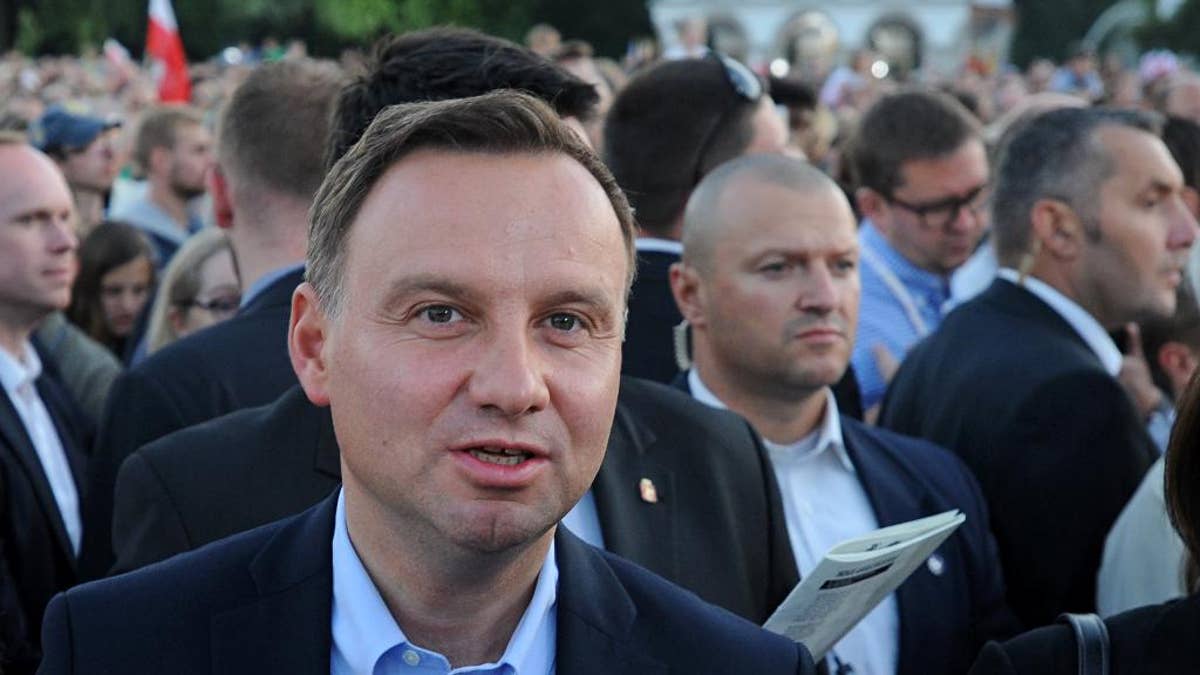
FILE - This Aug. 1, 2015, file photo shows Polish President-elect, Andrzej Duda at the Pilsudski square on the 71st anniversary of the insurgency, in Warsaw, Poland. It’s been a dream of some Polish leaders for nearly a century: an alliance of Eastern European countries running from the Baltic Sea down to the Black Sea that would keep Russia at bay. Poland’s conservative new president, Duda, who took office two weeks ago, has already signaled that building such an alliance under Warsaw’s leadership will be a priority of his presidency. (AP Photo/Alik Keplicz, File) (The Associated Press)
WARSAW, Poland – It's been a dream of some Polish leaders for nearly a century: an alliance of Eastern European countries running from the Baltic Sea down to the Black Sea that would keep Russia at bay.
Poland's conservative new president, Andrzej Duda, who took office two weeks ago, has already signaled that building such an alliance under Warsaw's leadership will be a priority of his presidency.
That ambition marks perhaps the most significant difference between Duda and his rivals in the centrist government, which for years has prioritized ties with major ally Germany, France and the European Union in a bid to become a significant player in mainstream Europe.
Duda's vision to create a more united front in the face of a resurgent Russia is part of a broader strategy for permanent NATO bases and soldiers in the region. Pursuing that goal, however, could strain ties with Germany, which has refused to allow NATO bases on the alliance's Eastern flank as it tries to avoid a further escalation of tensions with Moscow.
In a recent interview on state radio, Duda said his goal is "very simple — to strengthen Poland's security, to strengthen the security guarantees for Central and Eastern Europe in the situation as it is now."
Duda can count on the support of the three small Baltic states and Romania, which are all deeply fearful of Moscow. However, he can expect an uphill battle in winning over Hungary, the Czech Republic and Slovakia, which have important political and economic ties with both Germany and Russia that they are reluctant to jeopardize.
Duda's predecessor, Bronislaw Komorowski, and the pro-EU Civic Platform-led government, which has ruled Poland for eight years, have also sought a permanent and significant presence of NATO boots on the ground — but only won a promise of warehouses with military equipment. For now, NATO's presence is limited to a regional command center in Szczecin, a city on Poland's western border with Germany, and some periodic military exercises.
Jedrzej Bielecki, a diplomacy writer for the Rzeczpospolita daily, said what is new is Duda's strategy: The new president will first try to build a coalition in the region and only then, once stronger, will he go to Berlin and Washington to see what he can achieve regarding a stronger NATO presence. A summit of the region's NATO members is planned for early November, ahead of an all-NATO summit next year in Warsaw.
"He understands the realities of power in Europe," Bielecki told The Associated Press. "It will be difficult, but it might not be unrealistic."
After the Ukraine crisis erupted last year, then-Foreign Minister Radek Sikorski asked NATO for two heavy combat brigades. But that never materialized, mainly due to Germany's insistence that NATO stick to the letter of a 1997 agreement with Russia.
Poland insists, however, that Russia's annexation of Ukraine' Crimean Peninsula last year has invalidated the act.
Duda doesn't have long to prove himself, given that the NATO summit in Warsaw next summer will take up the question of NATO presence in the region. It could be the most important political test of his five-year presidency, Bielecki said.
Most political experts stress that Duda's foreign policy will actually be marked by a much greater degree of continuity than change. He himself has repeatedly stressed that there will be "no revolution" — only a "correction." But a greater shift is expected after the October parliamentary election in which Law and Justice, the party that supports him, is expected to win.
Marcin Zaborowski, vice president of the Center for European Policy Analysis, notes that Duda's first foreign visit, to Estonia on Sunday, underlines the continuity, given Poland's excellent ties with Estonia. Had he wanted to signal a new course he could have headed first to Lithuania, where limits on the rights of the country's ethnic Polish minority remains a cause of strain between the two neighbors.
Duda's second foreign visit, to Berlin on Sept. 28, is also a strong signal he wants to maintain good relations with Germany.
Some observers, however, have predicted that ties with Germany will cool. The Law and Justice party has taken a combative stance in the past toward Germany. And ties between the two countries suffered when party leader Jaroslaw Kaczynski was prime minister from 2006 to 2007, and when his twin brother Lech was president from 2005 to 2010.
President Lech Kaczynski was killed in a plane crash in Russia in 2010.
Several party members have hinted that a more assertive stance toward Berlin is on the horizon. Duda's foreign policy adviser, Krzysztof Szczerski, spoke in an interview of "conditions" Poland would impose on Germany for maintaining the current close partnership, though in recent days he has backed away from that language.
Another Law and Justice member, Witold Waszczykowski, told The Associated Press his party does not want ties to cool with Germany. But he also voiced a feeling shared by some party members that Germany has not been firm enough with the Kremlin, choosing its economic interests over obligations to protect Poland's security.
Waszczykowski, a former deputy foreign minister, said Poland should demand that Germans clarify "who is more precious to them."
"They must make up their mind," he said.
